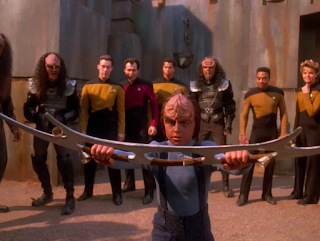Episode: "Firstborn"
Series: Star Trek: The Next Generation
Season 7, Episode 21
Original Air Date: April 25, 1994
Alexander shows no interest in becoming a warrior, causing his father great worry. At Picard's urging, Worf takes his son to Maranga IV to join in the festival of Kot'baval, hoping to spark the boy's interest in Klingon culture. During the visit, Worf is attacked, then rescued by a mysterious stranger who identifies himself as K'mtar, advisor to the House of Mogh.
Not all is as it seems...
This is TNG's last Klingon story. It involves both Alexander and time travel so I'm not exactly a fan. It's a shame. Worf's complicated relationship with his Klingon heritage is one of the series's richest narrative wells. Three decades on, we know this is far from the end of the thread but as NextGen staggers to the end, a more satisfying send off would have been nice.
As part of the festival, street performers reenact the fight between Kahless and the traitor Molor. While I'm not fond of this episode overall - and the performance itself is ultra-hokey - I love this glimpse of the arts within Klingon culture. I'll talk about this more when it's time to wrap up but even thirty years and hundreds of episodes and films later, Star Trek's greatest need is the deeper exploration of non-human cultures. Largely thanks to Worf, Klingons get the most attention in NextGen and would seem the best candidates. Even so, we are still provided only a severely monolithic perspective. "The Klingons are a warrior race," we're told. Really? All of them? A population of billions spread out over hundreds of planets with millennia of history and all any of them cares about is war? I find that difficult to believe.
Think of everything going on in the world right now in 2023. The monolithic perception of the other is everywhere. But not all Palestinians are terrorists. Not all Israelis are soldiers. Most people in the region - or anywhere else - are just trying to get on with the blessed day, hoping for a better life for themselves and their children, wanting to get along with the neighbors because the alternative is horrifying. It's hardly surprising that when people kill each other, they see the worst in the people doing the killing.
But if we're ever going to heal, we need to rise above. Yes, I know that's easy for me to say from thousands of miles away but that doesn't make it less true. It's a lot easier to kill people once you've dehumanized them.
The entire Star Trek concept is based on a premise: Earthlings will be ready to explore outer space once we've learned to get along better with each other. Unfortunately, Trek stories themselves often reveal how much work is left to be done. Not all Klingons are warriors or even wish to be. As in any culture in world history, some are farmers, some are engineers, some are clergy, some are teachers, some are artists and musicians, some are busy trying to raise their kids. They love their families. They want to live a good life. Some of them are street performers, not so different from the ones I see on Church Street in Burlington. Every glimpse we are offered of a broader Klingon society makes their culture more real.
Star Trek - and its legions of fans - need to get past seeing humanness as the ideal. It's too close to the prevalent perspective of white culture in the United States and beyond. Are we any better 29 years later? Not better enough. I believe Star Trek can and should be part of the solution.
Acting Notes
Gwynyth Walsh played the role of B'Etor, one of the notorious Duras sisters. She was born November 7, 1956 in Winnipeg, Manitoba. She graduated with a BFA from the University of Alberta. In fine Trek tradition, she's an accomplished Shakespearean, winning a Dramalogue for her portrayal of Beatrice in A Midsummer Night's Dream.
Beyond her numerous Trek appearances, Walsh was a series regular on DaVinci's Inquest and had recurring roles on Black Summer and Virgin River. Films include Blue Monkey, The Crush and Star Trek Generations (as B'Etor).















